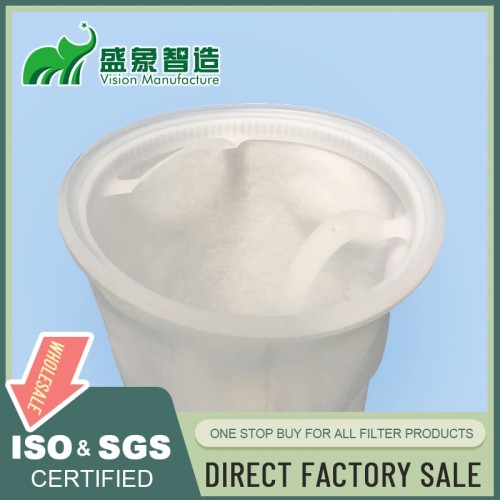
Polypropylene Filter Cloth: Versatile Solutions for Efficient Industrial Filtration
I. Introduction
Polypropylene, a versatile synthetic fiber, has become increasingly prominent in the field of industrial filtration due to its unique properties and cost-effectiveness. This introduction explores polypropylene's role as a filtration material, emphasizing its growing importance in various industrial processes and its ability to meet diverse filtration needs effectively.
II. Understanding Polypropylene Filter Cloth
Polypropylene filter cloth is crafted from the polymer polypropylene, known for its excellent chemical and mechanical properties. This section delves into the composition and structure of polypropylene, the manufacturing processes involved in producing polypropylene filter cloth, including woven, nonwoven, and felted types, each offering distinct advantages for specific applications.
III. Key Properties of Polypropylene Filter Cloth
Polypropylene filter cloth stands out due to its:
- Chemical Resistance: Resists a broad range of chemicals, making it suitable for harsh environments.
- Moisture Resistance: Does not absorb water, ensuring performance stability in wet conditions.
- Strength and Durability: Offers sufficient strength for repeated use and durability under mechanical stress.
- Temperature Tolerance: Performs well under a wide range of temperature conditions.
- Low Cost and Availability: Widely available and cost-effective compared to many other filtration materials.
- Lightweight Nature: Easy to handle and install due to its light weight.
IV. Applications in Industrial Filtration
Polypropylene filter cloth is used in a variety of industrial filtration applications:
- Water and Wastewater Treatment: For filtering out contaminants from water sources.
- Chemical Processing: Used in the filtration of chemical agents and solutions.
- Food and Beverage Industry: Ensures the purity and safety of products during manufacturing.
- Pharmaceutical Manufacturing: Critical in maintaining contaminant-free environments.
- Mining and Mineral Processing: Filters out particulates during the extraction process.
- Automotive Industry: Used in filtration processes within manufacturing operations.
- Other Industrial Uses: Applied in various sectors where durable and efficient filtration is necessary.
V. Advantages of Polypropylene Filter Cloth
The benefits of using polypropylene filter cloth include:
- Excellent Chemical Compatibility: Suitable for use with a wide range of chemical substances.
- High Filtration Efficiency: Effectively removes particles and contaminants.
- Easy Cleaning and Maintenance: Simplifies upkeep and prolongs service life.
- Cost-effectiveness: Offers a good balance between performance and expense.
- Resistance to Bacterial Growth: Prevents the proliferation of bacteria, maintaining hygiene in processes.
VI. Limitations and Considerations
While polypropylene filter cloth offers many advantages, there are limitations to consider:
- Temperature Limitations: May degrade at very high temperatures.
- UV Sensitivity: Can be degraded by prolonged exposure to ultraviolet light.
- Potential for Static Buildup: May generate static electricity under certain conditions.
- Environmental Considerations: Focus on the recyclability and environmental impact of used materials.
VII. Selecting the Right Polypropylene Filter Cloth
Selecting the appropriate polypropylene filter cloth involves:
- Factors to Consider: Such as micron rating, flow rate, and chemical exposure.
- Cloth Design and Weave Patterns: Tailored to meet specific filtration performance requirements.
- Surface Treatments and Finishes: Enhance functionality and lifespan.
- Vision Filter's Approach: Customized solutions that leverage advanced polypropylene technologies for optimal performance.
VIII. Installation and Maintenance
Proper installation and regular maintenance are crucial for maximizing the effectiveness and longevity of polypropylene filter cloth:
- Installation Techniques: Ensuring correct placement and secure fitting.
- Cleaning and Care Procedures: Regular cleaning to maintain filtration efficiency.
- Monitoring Performance and Efficiency: Keeping track of performance to anticipate maintenance needs.
- Troubleshooting Common Issues: Addressing problems promptly to prevent operational disruptions.
IX. Comparing Polypropylene to Other Filter Materials
When compared to materials like polyester, nylon, or PTFE, polypropylene filter cloth often provides a cost-effective solution with sufficient performance for many applications, though it may not match the high-temperature or chemical resistance of some alternatives.
X. Environmental and Sustainability Aspects
Polypropylene filter cloth contributes to sustainability through:
- Recyclability: Emphasizing the importance of recycling used materials.
- Energy Efficiency in Production: Reducing energy consumption during manufacturing.
- Lifecycle Assessment: Evaluating the environmental impact throughout the product's life.
- Biodegradable Alternatives and Innovations: Exploring eco-friendly options for future developments.
XI. Innovations in Polypropylene Filter Cloth Technology
Vision Filter is at the forefront of innovations in polypropylene filter cloth technology, including:
- Advanced Weaving Techniques: Enhancing the structural integrity and performance of filter cloths.
- Nanofiber Enhancements: Improving filtration efficiency through nanotechnology.
- Smart and Reactive Polypropylene Fabrics: Incorporating functionalities that respond to environmental changes.
- Vision Filter's Contributions: Developing cutting-edge solutions that meet the evolving needs of the industry.
XII. Case Studies: Polypropylene Filter Cloth in Action
Real-world applications demonstrate the effectiveness of polypropylene filter cloth in various industries, showcasing its ability to solve complex filtration challenges and deliver significant performance improvements.
XIII. Future Trends in Polypropylene Filter Cloth
The future of polypropylene filter cloth looks promising with potential advancements in material properties and integration with IoT and smart filtration systems, enhancing its applicability and efficiency in industrial filtration.
XIV. Conclusion
Polypropylene filter cloth continues to play a vital role in industrial filtration, offering a balance of performance, cost-effectiveness, and environmental sustainability. As the industry evolves, staying informed about the latest advancements in polypropylene technology is crucial. Vision Filter remains committed to providing expert solutions and consultation to help industries meet their filtration needs effectively and sustainably.
Leave a comment

